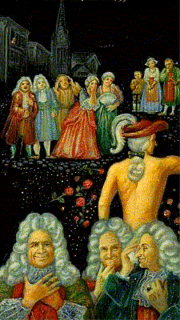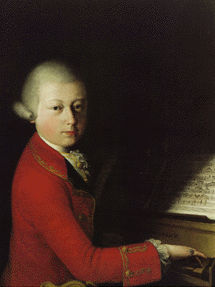 Program Notes: The Abstract Composer's Saving Grace
Program Notes: The Abstract Composer's Saving GraceHow valid is music that requires a philisophical essay to explain why the listener should be interested? I remember going to one of those "Emporer's New Clothes" types of new-music concerts where everyone pretends to understand and enjoy what's going on, when there's really nothing to understand or enjoy. As I struggled to sit through one of the pieces, I began reading the accompanying, lengthy program notes. The composer of the piece claimed to be using "silence as a quasi-contrapuntal device." When I read this, I chuckled to myself at the outrageously meaningless, but at the same time, quasi-compelling phrase. There was, of course, no real counterpoint in the piece (or any musical ideas whatsoever) -- It was just the composer's way of using big words to mystify the audience into believing his piece was worthwhile.
I came away from this concert with an idea for a future composition of my own. I had always been fascinated by canons of various types, and I'd just finished writing a piece called Thirteen Diverse Canons at Each Interval (each chromatic interval from unison to octave). My new idea would be to extend the piece by writing a canon at the interval of "silence." It would be just one line, and I would leave the responsibility of realizing the answering voices to the listener (to do in his or her head). These voices could enter at any pitch or time interval, and could be manipulated in any way (augmentation, inversion, retrograde), as long as the listener was sophisticated enough to keep track of them. In other words, the composition would cater to every level of listener -- in fact, the least (musically) sophisticated member of the audience could still just follow the single line. A problem would arise, of course, for listeners who chose very large time intervals between canonic entries, because they'd still be in their seats long after the concert was over (for this reason, my piece would have to be last on the program). All of this would be explained, of course, in the lengthy program notes.



